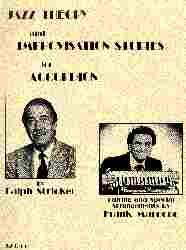
Editing and Special Arrangements by Frank Marocco
Jazz Theory and Improvisation Studies for Accordion

Editing and Special Arrangements by Frank Marocco
published: 1991
Review date: November 2001
Publisher: Ralph Stricker
500 Adams Lane, 14R
North Brunswick, NJ 08902
Review by Henry Doktorski:
Ralph Stricker and I go way back. It must have been 1963 (nearly 40 years ago) when I began my first accordion lessons at Hi-Way Music on Route 18 in East Brunswick, New Jersey, where Ralph taught accordion. Ralph was, and still is, a serious musician. He has fine taste and appreciates those who recognize art in music. He quoted Bernard Peiffer in his book: "Music is next to God. I wouldn't lower God, so why music."On the other hand, he has little tolerance for those who have bad taste. In the mid-1960s when accordion enrollment declined (not just in his studio, but throughout the nation) and students wanted to learn how to play rock 'n roll guitar, he decided to sell his music business rather than cater to the lowest common denominator and teach what he considered the epitome of degradation: banal songs which consisted of only three chords.
Stricker's book, Jazz Theory and Improvisation Studies for Accordion, shows how to become a competent jazz accordionist and actually create beautiful and fascinating chord progressions to accompany a melody. He takes you through the basics, beginning with scales, modes, chord structure, altered chords, inversions, with an emphasis in the beginning on developing left hand technique through exercises. I consider the section on ear training especially important, and here Ralph's humor becomes apparent. He wrote, "The object of this exercise is to be able to have the chromatic scale sounding on the 12 water tumblers. This will take time and patience and you may eventually flood your kitchen, but it will be worth the time. I suggest you do this when no one else is around as they may call for the men in white coats to take you away."
Dispersed throughout the book are arrangements of standard jazz tunes such as My Funny Valentine, Just Friends, Emily, How About You, The Touch of Your Lips, Gershwin's Summertime, Ellington's Prelude to a Kiss, and others in accordion arrangements by the author, Frank Marocco and Eddie Monteiro. Of particular interest to me was an analysis of a Chopin Nocturne revealing the altered chords.
The book consists of 132 pages held together with a spiral binding with card stock cover. I congratulate Ralph Stricker for his contribution to the advancement of accordion artistry.
| About The Free-Reed Review |
| Invitation to Contributors / Submission Guidelines |
| Back to The Free-Reed Review Contents
Page |
| Back
to The Classical Free-Reed, Inc. Home Page |